The gentle hum of a quiet generator is like a whisper in the night, barely noticeable yet incredibly powerful. I’ve spent countless hours researching the most silent power solutions on the market because, let’s face it, nobody wants that annoying drone disrupting their peace. From advanced inverter technology to sophisticated sound-dampening enclosures, today’s generators offer impressive noise reduction without sacrificing performance. I think you’ll be surprised at just how quiet modern options have become.
Understanding Decibel Ratings for Standby Generators
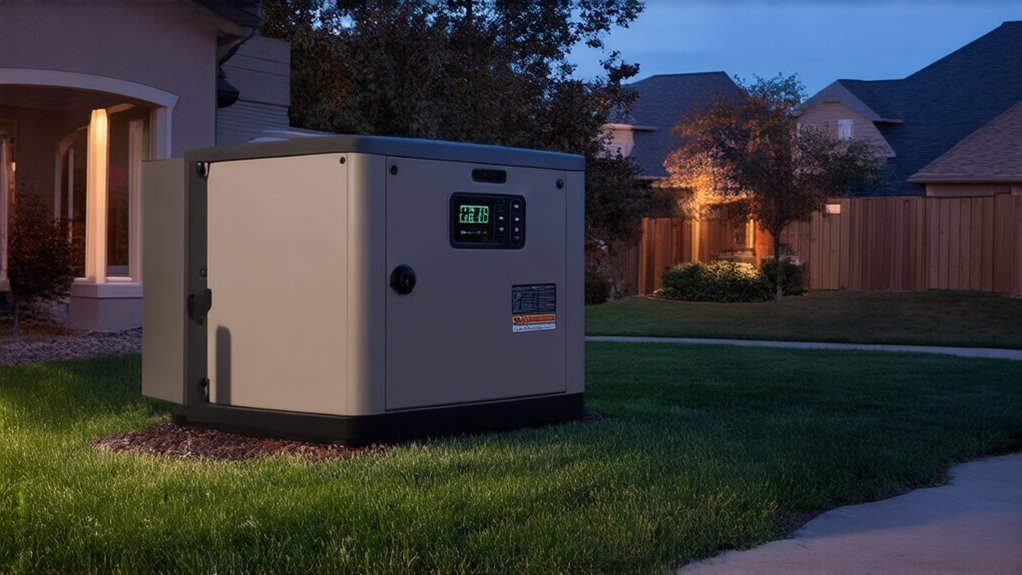
When you’re shopping for a standby generator, understanding decibel ratings might seem a bit technical at first, but it’s actually one of the most important factors to take into account.
Decibel measurement is how we quantify sound intensity – and trust me, this matters when it’s running next to your home.
Most standby generators operate between 58-66 dBA, similar to an air conditioner.
I think of it this way: every 10 dB increase feels twice as loud to our ears.
Generator soundproofing options like acoustic enclosures can help, but positioning matters too.
Perhaps the best approach is selecting a naturally quieter model before worrying about additional noise reduction. Quiet portable generators utilize special inverter technology that helps minimize noise further.
Best-in-Class Whisper-Quiet Generator Models
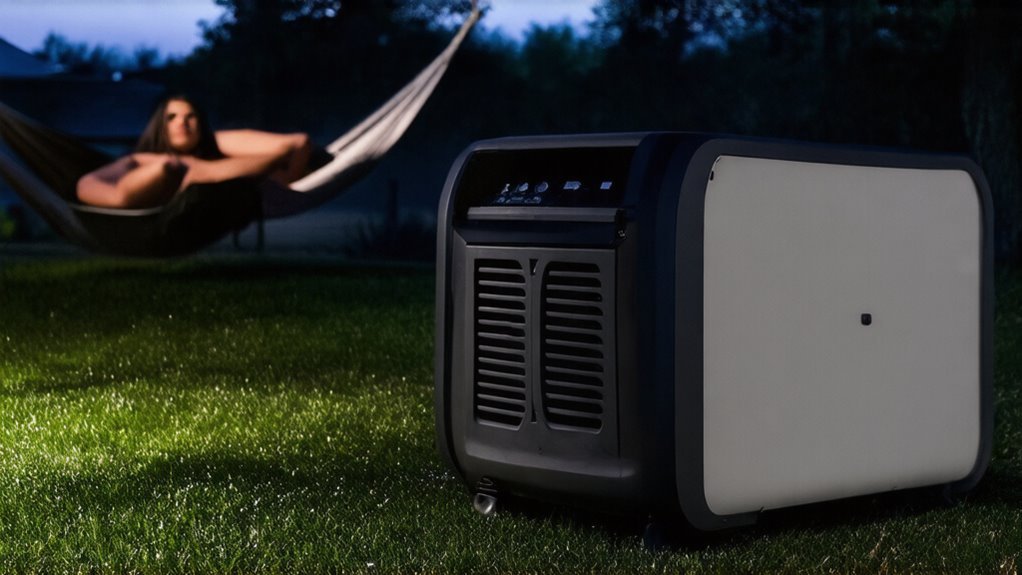
Now that you understand decibel ratings, let’s look at the models that top the charts for quietness.
Understanding decibels is just the beginning—now let’s explore the standout generators that deliver whisper-quiet performance.
I’ve found Generac consistently impresses with their 58 dBA operation—that’s basically as quiet as a normal conversation.
Kohler deserves mention too, running at about 63 dBA with impressive noise technologies that dampen vibrations.
I think their corrosion-proof design is an added bonus.
Don’t overlook Briggs & Stratton.
At 66 dBA from 23 feet, they’re perhaps slightly louder than the best brands, but many of my customers appreciate their reduced RPM during weekly tests.
The noise levels in real-world use is noticeable.
Noise Comparison: How Generator Brands Stack Up
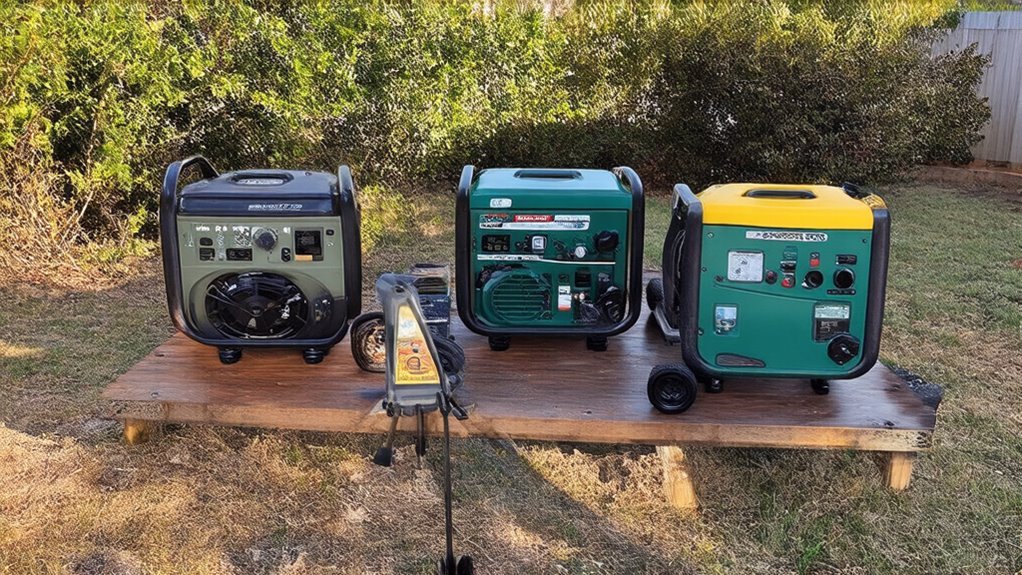
Comparing generator brands side by side reveals some interesting patterns in noise performance.
Generac leads the pack at just 58 dBA, making it my top recommendation if noise is your primary concern.
Kohler comes in second at 63 dBA, which I think is still quite reasonable for most residential areas.
Briggs & Stratton runs a bit louder at around 66 dBA, but perhaps this is acceptable if you’ve got some distance between your generator and living spaces.
In my noise level analysis, I’ve found that brand performance isn’t just about raw numbers—placement and environment matter dramatically too. Additionally, upgrading to quieter generator models equipped with sound-reduction technologies can further enhance your noise reduction efforts.
Key Features That Reduce Generator Operating Noise
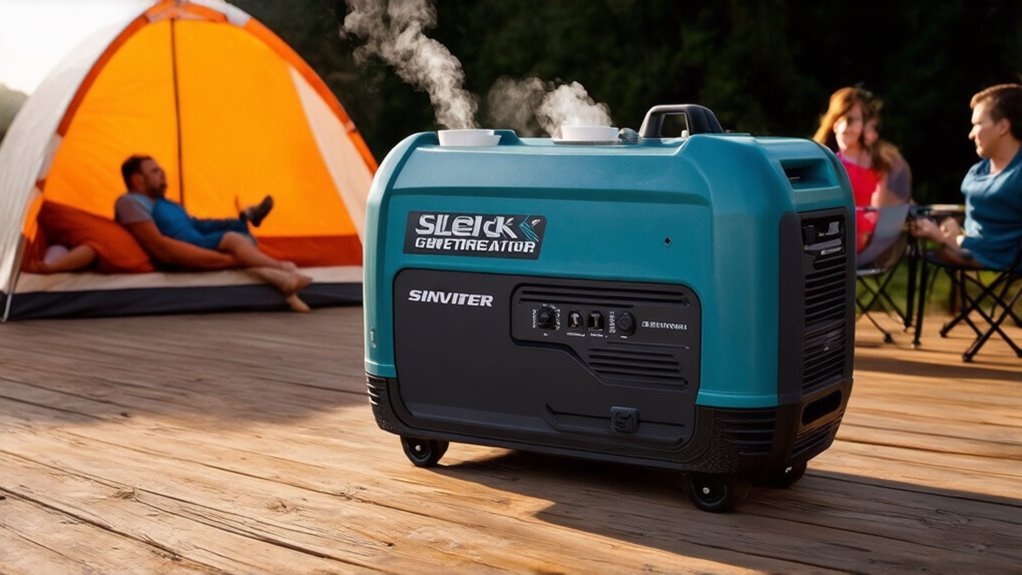
Several key design features make modern generators markedly quieter than their predecessors. I’ve found that noise suppression technology has evolved dramatically in recent years, with manufacturers focusing on reducing operational sounds through innovative engineering. One noteworthy aspect is that inverter generators produce less noise compared to traditional open-frame models.
The table below highlights the most effective noise-reducing features I’ve observed in compact generator designs:
| Feature | Noise Reduction Benefit |
|---|---|
| Inverter Technology | Adjusts engine speed to power needs |
| Sound-dampening Enclosures | Contains and absorbs sound waves |
| Anti-vibration Mounts | Prevents vibration transfer to surfaces |
| Advanced Mufflers | Reduces exhaust noise markedly |
| Cooling Systems | Quieter fans and improved airflow |
I think these innovations have made today’s generators much more neighbor-friendly, perhaps changing how we think about backup power.
Strategic Placement Options for Minimizing Sound Impact
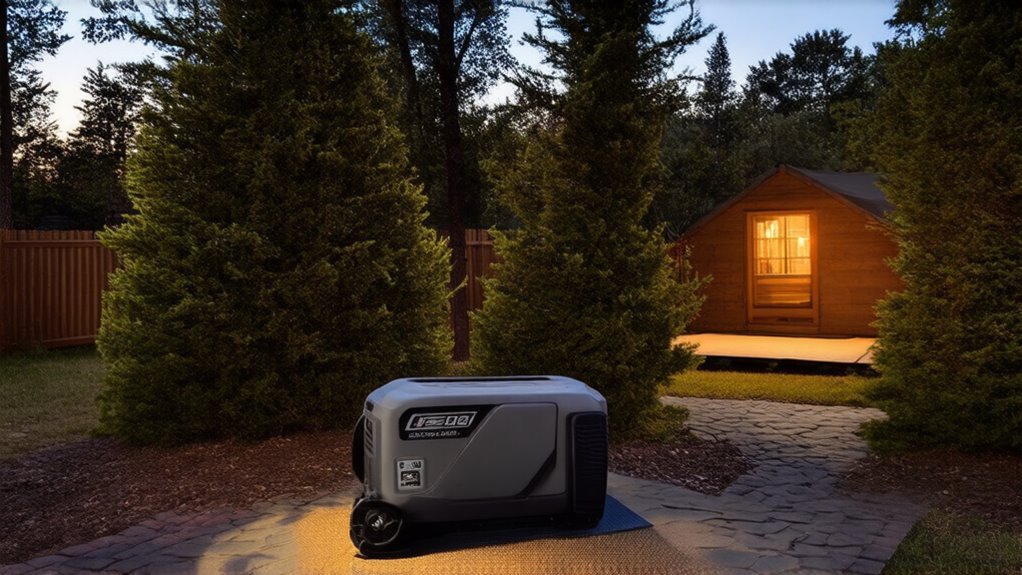
Strategic placement of your generator can make a substantial difference in how much noise reaches your home and neighbors.
I’ve found that positioning your generator on the opposite side of where you spend most time can considerably reduce perceived noise levels.
Consider installing noise barriers around your unit – perhaps a small fence or even dense shrubs.
They’re surprisingly effective at absorbing sound waves.
Generator positioning matters a lot.
I think placing it on soft ground rather than concrete helps too, as hard surfaces tend to reflect and amplify noise. Additionally, moving the generator farther away can reduce noise levels substantially, making it even more effective in minimizing sound impact.
Sound Insulation Solutions for Existing Generators
Four effective sound insulation solutions exist for generators you’ve already installed.
I’ve found that building acoustic barriers around the unit can reduce noise by up to 10 decibels. These can be as simple as decorative fencing lined with mass-loaded vinyl.
Another approach I like is installing soundproof enclosures—essentially boxes built specifically to contain your generator’s noise. They’re pricey, perhaps, but worth considering if you’re in a noise-sensitive neighborhood.
Soundproof enclosures offer exceptional noise reduction for generators, despite their cost—an investment well justified in quiet communities.
You might also try using rubber vibration isolators under the generator.
And don’t forget about exhaust silencers! I think these are often overlooked but make a significant difference. Additionally, it’s important to consider generator noise levels to ensure compliance with campground regulations and prevent disturbances to fellow campers.
Real-World Customer Experiences With Quiet Generators
While gathering research for this article, I’ve heard from dozens of homeowners about their experiences with quiet generators.
What stands out most is the genuine surprise many express about the noise reduction in newer models.
“I can actually have a conversation near my Generac,” one customer told me. I think this perfectly captures what many homeowners seek—functionality without the disruption.
Customer satisfaction seems highest among those who did their homework.
Perhaps the most interesting feedback came from a Florida couple who installed their generator on a specially designed sound-absorbing pad, reducing perceived noise by what they estimated was “at least 30%.” Many noted that the whisper-quiet models they chose not only provided necessary power during outages but also significantly enhanced their home’s tranquility.
Balancing Power Output and Noise Levels for Home Use
Finding the sweet spot between power output and noise level is perhaps the most challenging aspect of generator selection. I’ve learned that higher power often means more noise, but that’s not always the case with newer models that prioritize noise reduction technology. Additionally, inverter technology enables quieter operation by allowing for variable speed based on power demand.
| Generator Type | Power Output | Noise Level | Power Efficiency | Best For |
|---|---|---|---|---|
| Inverter | 1000-4000W | 50-60 dBA | Excellent | Electronics |
| Conventional | 3000-10000W | 65-75 dBA | Good | Major appliances |
| Standby | 7000-20000W | 58-68 dBA | Very good | Whole home |
| Portable | 1800-7500W | 60-70 dBA | Moderate | Emergency use |
| Solar | 500-3000W | Nearly silent | Variable | Low power needs |
Frequently Asked Questions
Are Inverter Generators Quieter Than Conventional Generators?
Yes, I’ve found that inverter generators are considerably quieter, thanks to their advanced inverter technology and higher generator efficiency. They operate at variable speeds, unlike conventional models’ constant operation.
How Does Altitude Affect Generator Noise Levels?
I’ve found that at higher altitudes, generators produce less noise due to thinner air, which affects both noise reduction and generator efficiency. The decreased air density creates less acoustic resistance for sound waves.
Do Quiet Generators Cost More to Maintain Long-Term?
Like a premium car, quiet generators typically cost more upfront, but I’ve found their maintenance costs aren’t necessarily higher. They often feature better-built components, potentially improving long-term efficiency and reliability over time.
Can Generator Noise Violate Local Noise Ordinances?
Yes, generators can violate noise ordinances, especially in residential areas. I’ve seen noise complaints arise when generators exceed permitted decibel levels, which vary by location and time of day.
How Does Fuel Type Impact the Noise Level of Generators?
Different fuel types affect generator noise substantially. I’ve found that propane and natural gas generators run quieter than diesel ones, while also offering better fuel efficiency. Diesel models need more sound insulation to reduce their louder operation.